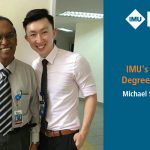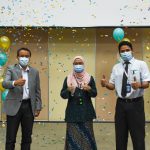25 June, 2016. It was graduation day for IMU’s fourth cohort of dentists from DT111, the cohort which I belonged to. I was there in the University’s auditorium at its campus in Bukit Jalil, Kuala Lumpur, Malaysia, along with my friends and family having my pictures taken amongst the celebrations and congratulatory messages flying around the room. It was a culmination of 5 years of hard work to obtain the right to hold the graduation scroll in our hands.
I was now an officially qualified dentist. It should have felt great, and it did. Yet, in the back of my mind, I felt a deep sense of unease nagging me throughout the day. It had been persistently bothering me throughout the last few weeks and I knew exactly why I was feeling that way.  You see, my classmates and I had officially finished our classes and degree around 6 months prior to our graduation ceremony. Everyone else in my cohort was waiting for their first job offers within the government sector to be processed. They were sure to be guaranteed a job within a few months. I was happy for them. They were all on their way to kickstart successful careers. However, my situation was slightly different. I was ineligible to work in the government sector with them. Why? Well, because I wasn’t a Malaysian national. My family and I had moved to Malaysia almost 20 years ago, but at that point in time, I was yet to be granted permanent residency status or citizenship. Another thing to understand is that most countries are very restrictive in terms of deciding who is and who isn’t eligible to register with the dental council and be an officially recognised practising dentist in the nation. This is understandable. The governing bodies have to be stringent on whom they allow to treat their citizens. Standards have to be enforced to maintain quality and these restrictions fall well within the rights of the dental governing bodies.
You see, my classmates and I had officially finished our classes and degree around 6 months prior to our graduation ceremony. Everyone else in my cohort was waiting for their first job offers within the government sector to be processed. They were sure to be guaranteed a job within a few months. I was happy for them. They were all on their way to kickstart successful careers. However, my situation was slightly different. I was ineligible to work in the government sector with them. Why? Well, because I wasn’t a Malaysian national. My family and I had moved to Malaysia almost 20 years ago, but at that point in time, I was yet to be granted permanent residency status or citizenship. Another thing to understand is that most countries are very restrictive in terms of deciding who is and who isn’t eligible to register with the dental council and be an officially recognised practising dentist in the nation. This is understandable. The governing bodies have to be stringent on whom they allow to treat their citizens. Standards have to be enforced to maintain quality and these restrictions fall well within the rights of the dental governing bodies.
| Registering as a Dentist |
|---|
| In Malaysia, the rules state that if you are neither a permanent resident or a citizen of Malaysia (or a spouse of either), you are ineligible to be granted full registration with the dental council. This means that you won’t be offered a position in the government sector and neither will you be allowed to treat patients in private practises. That’s not to say that Malaysia doesn’t have international dentists working in the country. Non-Malaysian dentists may be granted permission to work in centres of higher education (dental universities) under a temporary practising certificate. It seemed to me that this was one of my few options to be able to obtain a job. I could work in a university clinic. But, this was easier said than done.
To be able to apply for a temporary practising certificate, the applying dentist had to be registered with a dental authority in a country outside of Malaysia. This could be any country in the world. The UK, USA, Australia, it didn’t matter. In my case though, I was not registered anywhere else and neither was my degree recognised overseas in any other nation. Thus, my only option was to first register myself with a dental council overseas and subsequently return to Malaysia to apply for a temporary practising certificate. This turned out to be my final plan. I did some research and found out that in order to register overseas, I had the opportunity to sit for licensing examinations to qualify myself to work in various other countries.
Each nation had its own examination syllabus, standards and protocol. Australia had the Australian Dental Council Examinations, Singapore had the Singaporean Dental Council Examinations, the UK had the Overseas Registration Examinations (ORE) and so on. Even so, many nations restricted the examinations to those they felt the country needed. Singapore’s exams, for example, were only open to those who were citizens, permanent residents (or spouses of either) and non-Singaporean specialists. India’s examinations were open to only citizens or persons of Indian origin and so on. |
I weighed up my options and went through an elimination process. Eventually I decided to attempt (among others) the UK’s licensing examination, the ORE. I knew that getting a registration in the UK would not be a walk in the park but at that point of time, I did not have too many other paths.
If I were to offer up one lesson I learnt during the entire process, it would be this: Talent is overrated. Practice and hard work are what differentiate the successful from the unsuccessful. Undoubtedly so. The results may take some time to show up, but they eventually will.
Strangely enough, within 2 weeks of me successfully passing the UK exams, my permanent residency application in Malaysia came through. 20 years since I first moved to Malaysia and I was now able to live and work without restrictions. To top it all off, due to my permanent residency status, I was eligible to work in the government sector as well, just like all my classmates from IMU. Two breakthroughs in just a couple of weeks. When it rains, it pours.
It’s now been over a year since then. As I’m sitting here writing this, the past year has seen me complete my compulsory service period in Malaysia and apply and subsequently secure a job in Scotland due to my experience with the ORE. Looking back, I can appreciate that the challenges I faced during my period of unemployment and failure have altered my personality, interests and mindset for the better. I feel more driven, ambitious and confident in my abilities. Whether these changes will stand me in good stead in the long run is something only the sands of time will reveal. For now, all I can do is try to improve myself every day, be grateful for what I have and look forward to the future. Let’s pick up our dental drills and keep grinding (pun intended)!
Written by IMU Dentistry Alumnus, Auleep Ganguly, a recipient of the 2016 Aflame Student Award Related articles: A Dental Journey Through IMU: An International Student’s Perspective Involvement in the Community Wins IMU Dentistry Student An Award











zhengzhihang
Hi. Im a foreigner dental student and having a almost same situation as you in Malaysia.So May I ask some questions about ORE examination?Can I have your contact way?Thank you.
IMU News
Hi, you can email your questions to [email protected]